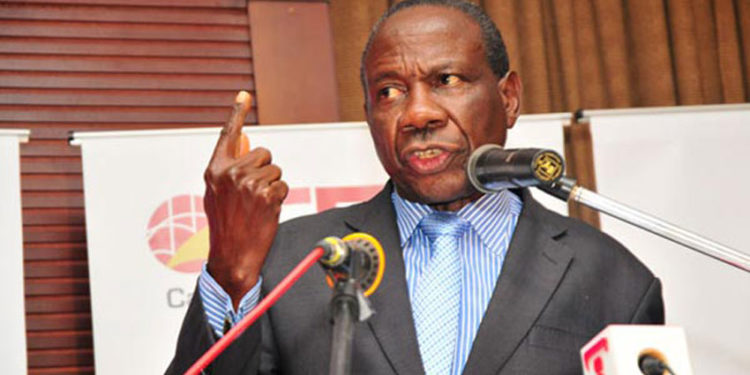Since the Covid-19 outbreak in 2020, Uganda’s debt burden has been increasing reaching 51.6 per cent (Shs73.78 trillion) as per the current figures from the Ministry of Finance, Planning and Economic Development.
According to the Ministry of Finance and Bank of Uganda, the debt increase was due to Covid-19. A period when the country experienced revenue shortfalls of Shs3.2 trillion in the Financial Year (FY)2019/20 and Shs2.2 trillion in FY2020/21.
Yet that was the same time, government expenditures increased to fight the covid-19 pandemic.
The Minister of Finance Matia Kasaija says due to high government expenditures at the same time the country was experiencing revenue shortfalls, there was a sharp increase in the budget deficits to 7.1 per cent and 9.0 per cent in FY2019/20 and FY2020/21, respectively.
Since the country was experiencing revenue shortfalls, the deficit was financed by a combination of reprioritization of the budget, and external and domestic borrowing and as a result, public debt to GDP rose from 41.0 per cent in FY 2019/20 to 51.6 per cent in FY2021/22.
Statistics have shown that Uganda’s increase in borrowing has resulted in a significant increase in the cost of debt service over the last two (2) fiscal years.
Therefore, debt service to revenue has increased to 30.6 per cent in FY2021/22 from 21.7 per cent in FY2019/20. This has further reduced the fiscal space and fiscal flexibility on resources available for other Government expenditures, including health, education and water.
However, while speaking at the National Budget Conference of Financial Year 2023/24 On Tuesday at Kololo independence grounds, Minister Kasaija alluded that there is an urgent need to reprioritize infrastructure projects and postponement of others, in order to re-establish long-term fiscal sustainability and reduction in borrowing.
Kasaija revealed that the government in the next financial year the medium term and the Government’s fiscal policy will prioritise improving competitiveness in the economy by lowering the cost of doing business while maintaining macroeconomic stability and debt sustainability.
He added; “This will entail focusing expenditure on projects and programmes that have a high multiplier effect on the economy, including export growth, ensuring food security, import replacement, and jobs creation; increased domestic revenue mobilization and prudent debt management strategies.”
Kasaija noted that fiscal discipline, efforts to boost domestic revenue by implementing the Domestic Revenue Mobilization Strategy, and prudent borrowing strategies will be important for the attainment of high sustained growth, job creation, and socio-economic transformation.
“Government will continue to maintain macroeconomic stability and support economic recovery through the use of coherent, cohesive and well-coordinated fiscal and monetary policies. Macroeconomic stability and debt sustainability will be achieved through boosting domestic revenue mobilization by implementing DRMS and use of growth-friendly fiscal consolidation,” he said.
Kasaija noted that to maintain debt sustainability, external financing will be obtained on largely concessional terms and on near-concessional terms to finance projects which are critical for reducing the cost of doing business and therefore enhance competitiveness, enhanced exports and import replacement, and facilitate regional trade.
He emphasized; “Domestic borrowing will be limited to an average of 2.2per cent of GDP over the medium term and gradually will be reduced to the long-term target of 1 per cent of GDP per annum, on average. Through its Public Investment Management reforms, Government will emphasize maximizing efficiency gains from public investments to increase returns.”
He added that Public Debt Management’s next financial year will also be guided by focusing on utilizing grants (where available) and concessional financing to implement projects within priority areas of government.
According to Kasaija, if such measures are put in place, the gradual fiscal consolidation will lead to a decline in public debt below 50 per cent of GDP in nominal terms.
He also emphasized that priority shall be accorded to contracting debt on concessional terms to lower interest payments; and obtaining debt service rescheduling through Debt Service Suspension Initiative (DSSI) which would offer additional fiscal space.
“Priority will be placed on investment in oil and gas sector infrastructure to get oil resources expected to accelerate Uganda’s economic transformation. This investment includes but is not limited to East African Crude Oil pipelines, Oil roads, and Industrial parks among others. These investments need to be financed partly through borrowing in FY 2022/23,” the Minister said.
Meanwhile, in the next financial year, domestic revenues are projected to amount to Shs29.784 Trillion, of which tax revenue and Non-Tax Revenue are projected at Shs27.774 Trillion and Shs2.009 Trillion, respectively.
This translates into nominal growth in revenues of Shs4.233 Trillion (equivalent to 16.6 per cent) up from Shs25.550.69 Trillion projected revenues for FY 2022/2023.
Do you have a story in your community or an opinion to share with us: Email us at editorial@watchdoguganda.com













